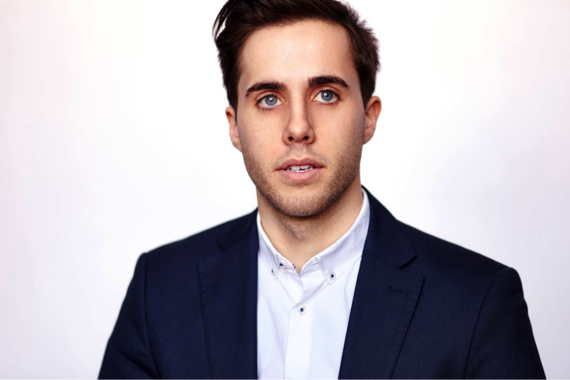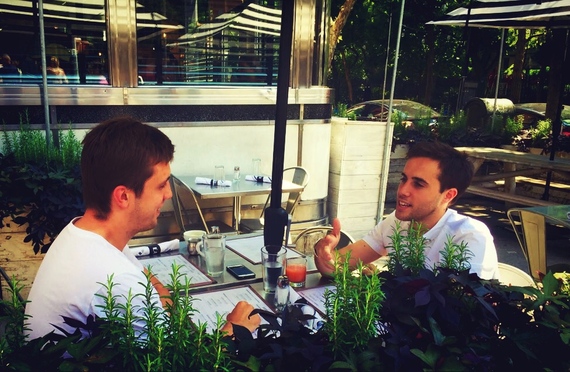
Photo Credit: Felix Dol Maillot
At his favorite diner in Chelsea in New York, Francesco Marconi talks about Frankly Speaking, his career playbook, which cuts through the noise of career cliches and promises to help navigate through the early career steps.
Francesco Marconi grew up fascinated by stories of success, but he was looking for something more. He observed that most books that talked about success did not mention how to navigate the first steps in one's career. The advice those authors shared was difficult to implement for young professionals beginning their career.
Marconi decided to solve the problem by developing his own career playbook, Frankly Speaking, an interactive collection of tips and anecdotes, illustrated by New York based designer Mike Bowser. It quickly became the site's favorite, inspiring readers from around the world. I sat down with Marconi at his favorite diner in New York to find out more.
Where did you grow up?
I was born in Coimbra, one of Portugal's first cities with over a thousand years of history. In fact, I believe it was the environment of a city like Coimbra, where tradition and nostalgia has such a commanding presence that made me aware that the past should be seen as something not to be revived, but something to be overcome. Hence my interest in future trends and innovation.
What was your biggest challenge transitioning to the "real world"?
When I was still in University, my professors paid attention to me, my work and dreams. I enjoyed this environment of constant encouragement and support. When I started my first job, the reality sank in, my ideas were no longer "great" and no one was particularly interested in what I had to say. It is the professors' job to build up our confidence. When transitioning to the "real world" young people need to make sure to bring as much of that encouragement as possible by building a support system of people that believe in us.
How do you stay inspired?
Everyone tells you that if you do what you love you will be happy and inspired. The problem is that no one tells you how hard it is to actually find your calling. Even when you know what you want to do, opportunities are not always easy to come by. To me, inspiration is about managing your own expectations, and being ready to seize opportunities when they first emerge. Author E. B. White alludes to this concept in a brilliant way. He explains that people need to look at life like sailors do, "things can look dark, then a break shows in the clouds, and all is changed, sometimes rather suddenly."
You told me that you loved reading career books. Have you discovered patterns for finding success?
There are different arguments that can be used to explain success. Some folks emphasize the random aspects of how you launch your career: you develop the right projects at the right time and as a result you receive attention and the process grows like a snowball. I am not talking about creating the next Facebook from your college dorm room. Success can mean getting a great job. In my case I had the chance to develop projects related to news innovation at the Missouri School of Journalism that eventually led to a dream job at the Associated Press in New York. Other arguments explain that our achievements are a result of a set of preferred connections that give us advantage. For example, having professors and mentors that help us build a network of connections that can open up new opportunities. A third argument also points to the intrinsic characteristics of the person, their personality and their motivations. The trick is combining those three arguments.
What principle guides your life?
I follow daily routines of concentration, creativity and reflection. I find that putting one small part of my life on auto-pilot has had enormous benefits for the rest of my work day. Most importantly, I try to be aware that time it is the most valuable asset we have.
What is a book you are most likely to give out to a friend?
"Letters of Note -- correspondence deserving of a wider audience", which is a collection of letters written by iconic figures in the arts, politics or society. For example, letters between Hemingway and Scott Fitzgerald discussing the book Great Gatsby, a request from Elvis Presley to be a secret agent addressed to President Nixon, and a thank you note written by the Director of Campbell Soup to artist Andy Warhol.
What is your favorite movie?
I have many. The Great Beauty by Paolo Sorrentino is one of them.
If you could have dinner with anyone in history, who would it be?
With so many changes in the news media industry, I would love to ask William Randolph Hearst and Joseph Pulitzer how they looked at their businesses back then. What were their challenges? How did they look at innovation? What would be their reaction if I told them that I could get news from the other side of the world from a small electronic brick in my pocket. Both Hearst and Pulitzer were two of the early pioneers in creating and distributing news.
Illustrations by Mike Bowser. You can start reading Frankly Speaking on Medium. If you enjoyed this interview, you can join my reading letter.


